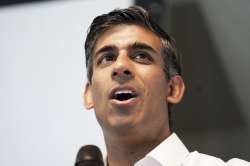Salman Rushdie stabbing: Rishi Sunak says attack should be wake-up call to sanction Iran
Salman Rushdie stabbed: The former Chancellor told ‘The Daily Telegraph’ that attempts to revive the Iran nuclear deal, known as the Joint Comprehensive Plan of Action (JCPOA), may be futile and therefore it was important to assess action against Iran’s Islamic Revolutionary Guard Corps (IRGC).

Salman Rushdie stabbed: The brutal attack on noted author Salman Rushdie should be a wake-up call for the West to impose tougher sanctions against Iran and proscribe the country’s elite military unit as a terrorist organisation, British prime ministerial hopeful Rishi Sunak said on Sunday. The former Chancellor told ‘The Daily Telegraph’ that attempts to revive the Iran nuclear deal, known as the Joint Comprehensive Plan of Action (JCPOA), may be futile and therefore it was important to assess action against Iran’s Islamic Revolutionary Guard Corps (IRGC).
He spoke as the suspect in the attack on Rushdie, Hadi Matar, was on Saturday charged with attempted murder and assault and remanded without bail. Preliminary investigations suggest his sympathies with the Shia extremism and IRGC. “The situation in Iran is extremely serious and in standing up to [Vladimir] Putin we can’t take our eye off the ball elsewhere,” Sunak told the newspaper.
“A nuclear-armed Iran would pose an existential threat to our ally Israel, and indeed imperil the whole of Europe with ballistic missile capability. We urgently need a new, strengthened deal and much tougher sanctions, and if we can’t get results then we have to start asking whether the JCPOA is at a dead end. The brutal stabbing of Salman Rushdie should be a wake-up call for the West, and Iran’s reaction to the attack strengthens the case for proscribing the IRGC,” he said.
ALSO READ | Salman Rushdie could lose an eye due to attack; suspect charged with attempted murder | 10 points
Under the original JCPOA agreement, signed in 2015, Iran received relief from sanctions in exchange for agreeing to strict curbs on its nuclear activities. Former US President Donald Trump withdrew America from the JCPOA deal in 2018, but President Joe Biden has sought to resuscitate it, arguing it is the best way of stopping Iran from developing a nuclear bomb.
A fatwa calling for Rushdie to be killed over his book ‘The Satanic Verses’ was issued by Iran's former Supreme Leader, late Ayatollah Ruhollah Khomeini, in 1989. Since the stabbing of Rushdie at a literary festival at the Chautauqua Institution in New York state on Friday, Iranian media have welcomed the attack and activists and opponents of the Iranian regime said its rulers bore responsibility for the attack.
While the Iranian regime appeared to renounce the threat in 1998, in 2019, Ali Khamenei, the current Supreme Leader, tweeted that the fatwa was “solid and irrevocable”.
Meanwhile, it has been reported that Rushdie sustained nerve damage to his arm, damage to his liver, and could lose an eye. The India-born author was taken off a ventilator in a Pennsylvania hospital and is now able to speak, according to fellow British American author Aatish Taseer, information confirmed by the writer's agent.
ALSO READ | Salman Rushdie attack: Biden expresses grief; says 'grateful to first responders' on scene
ALSO READ | Salman Rushdie attack: Author taken off ventilator, accused pleads 'not guilty'
